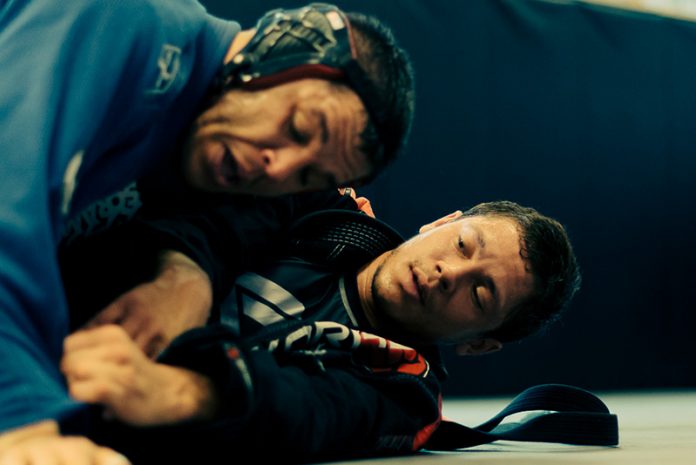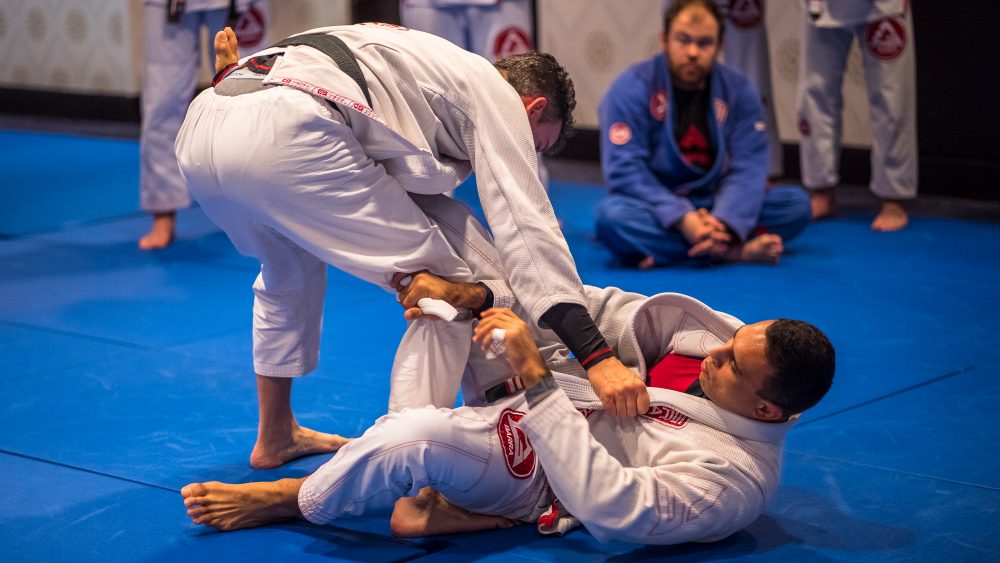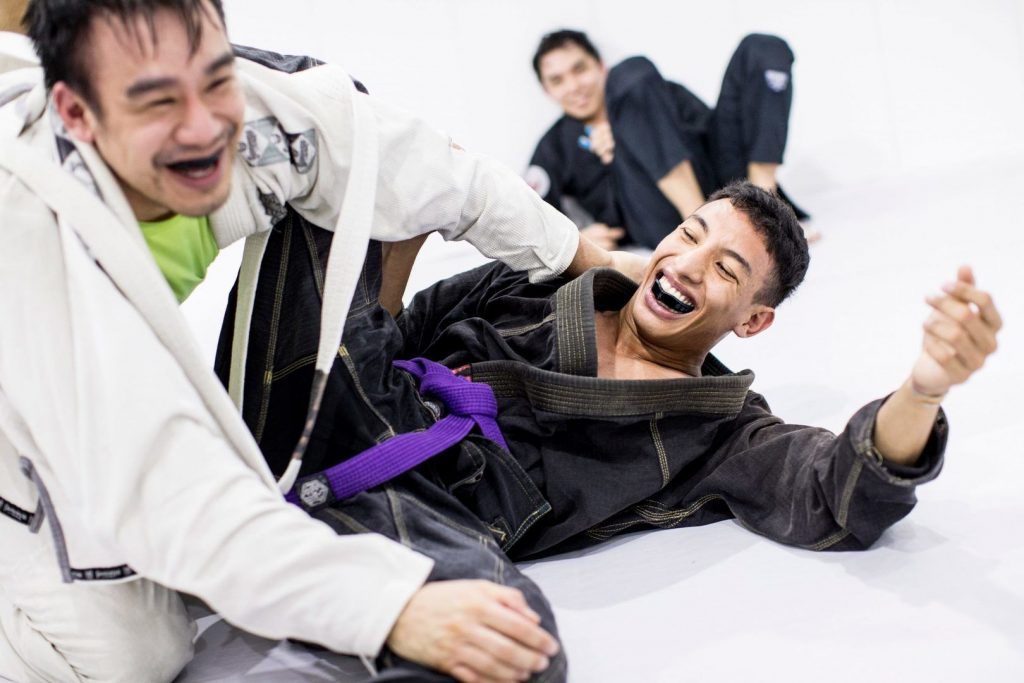
Where would we be if we had to train BJJ on our own? Well, I guess we’d be at this point in time, trying to make grappling dummies out of pillows and old Gi tops. Jokes and pandemic lockdowns aside, training Jiu-Jitsu requires two people (at the very least). Even in online programs, it takes a partner for it all to make sense and for real progress to ensue. That said, the more Jiu-jitsu partners we have to train with, the better we will become. Now, not everyone we train with is a great training partner, so let’s take a look at some of the traits that make a great jiu-jitsu training partner.
One of the main reasons why we enjoy training BJJ so much is the human connection factor. Say what you want, but everyone needs human contact, and there’s nothing that delivers on than more than Brazilian Jiu-Jitsu. Granted this might not be the best time to talk about close contact with the Covid-19 pandemic out and about. However, the fact still remains that we need a Jiu-Jitsu partner to actually training the art/sport. That also means other people need us, so why not try our best to be a great training partner for them?
Value Your Training Partners
If you’re reading BJJ World regularly, you’ve surely seen the quote I’m about to use. It is a quote my professor old me really early on in my Jiu-Jitsu journey and it stuck with me. What he said was this: “The most valuable material possession we have are our bodies. That means that every time we train, we give someone our most valued material possession to use and play with. If they “break it”, we won’t want to extend the same courtesy to that particular training partner again.” This really sums up how important a good jiu-jitsu partner is for training.
It doesn’t matter what belt you are, as a BJJ practitioner you need to make a clear distinction between what a training partner is, and what an opponent is in a competitive match. Sadly, I see people not making this particular distinction way too often. In competition, your goal is to win. That doesn’t mean you need to destroy your opponent mercilessly, but you should be aiming to apply your BJJ knowledge in a way it was intended to. Training, on the other hand, is akin to just playing around.

The Marks Of A Great Jiu-Jitsu Partner
There are certain things that really set some jiu-jitsu partners aside from others. In that sense, it doesn’t matter if they’re higher or lower belts. There are higher belts that spaz out completely, as well as lower belts that roll as calmly as Hello Gracie themselves. So, belt color is not important right off the bat.
What matters are the traits that make every roll, drill, or technical practice with a certain training partner an enjoyable experience? As much as trying to strangle one another can be enjoyable, of course. In any case, if you know the marks of a great jiu-jitsu partner, you might just adopt some of them you might be lacking to become a great one yourself. Here is a selection of the most important ones:
Hygiene
This goes first, and I won’t dwell on it. Simply reading the word “hygiene” needs to be enough. Especially now, in the post-Covid-19 world, where people are freaked out about cleanliness and health anyway. If you’re sick, stay at home. Wash your Gi, wear a rash guard underneath, an trim your talons. If you really want to know more about personal BJJ hygiene, read this article.
Focus
One of the things that really puzzles me is the patience span of BJJ people. Despite knowing that we need to be patient, time things, and set traps, we all want everything to happen instantly. Often times, we end up unfocused and trying to do things that help neither us not the Jiu-Jitsu partner we’re training with. Focus is extremely important in training even more so than in competition, actually.

Be Welcoming
Once again it doesn’t matter if you’re’ a three-stripe white belt or a brown belt. When new people walk in be welcoming. There’s no need to act stuck up and look down on folks. Remember how you felt the first time you needed to pick a jiu-jitsu partner for a roll? Stay cool, welcome people, explain things to them and help them along the way. You can learn something form every roll, even if you’re a black belt rolling with the person that just signed up.
Drill, Don’t Kill
Also very important. Drilling is one part of BJJ that most of us get wrong. People usually either dedicate too much or not enough. Both are examples of not being a good jiu-jitsu partner. Coaches usually set both goals and tempo for drills. Respect them. If you go too hard, it turns into position sparring, and that’s not the intention of drills. If you just go through the motion, you’re actually doing the other person a disservice.
So, drill as the instructor says, even if you don’t like that particular drill. One day in soon, your partner might not like a drill but they’ll shut up and be a good partner about it because you were.
Be In Control (Of Yourself)

There’s no place for revenge submissions because they caught you, or deciding you’ll do a move at all costs. That quickly spirals out and you turn into a spaz. If you want o e a good training partner, you need to keep a clear head and always be in control of your emotional state.
Tap
You’ll never learn Jiu-Jitsu if you don’t tap. And that doesn’t just mean tap to higher belts. Tap to everyone. Of course, they’ll have to earn it, but when they do, you don’t just bust out by force or some last-ditch move. Tap, let them have the experience and learn from it so that they have to work harder the next time. A good jiu-jitsu partner drags people up in training, not down. And the best way to do that is to tap out.
Communicate
As much as the physical aspect is important in Jiu-Jitsu so is the social one. Make sure you communicate with your partner at all times. Whether it is before a roll, asking if they’re ok, during, or after, you need to always be willing to talk. That doesn’t mean chat about anything and everything as you roll. But you do need to have feedback that concerns whatever it is you’re both doing.
If you’re a higher belt, you also have the obligation to always answer the questions you know how to answer to lower belts.
Support The Team
This is something that people really appreciate. Whether you show up to pair up with someone for competition classes even if you don’t compete, or show up at a competition as support, that is always welcome. It is also a trait of the very best Jiu-Jitsu partners out there. Just be there for your team, as much as you can. One day for sure they’ll be there for you as well.
In Summary
Training with a good Jiu-Jitsu partner can make all the difference. In reality, we can’t expect everyone to be on the same level, but if more people put just a bit more thought into it, we’d certainly see a lot more great partners and have more great rolls than average ones. And it is not that hard to be a good BJJ training partner. Or even a great one.


![Darce Choke Encyclopedia – Origins, Mechanics and Variations [2024] BJJ, choke, Brabo, BJJ Darce Choke, D'arce Choke, Darce BJJ Choke](https://bjj-world.com/wp-content/uploads/2017/11/JungPoirierLeeYahoo-218x150.jpg)









![I Got Your Back Jake Straus DVD Review [2025] I Got Your Back Jake Straus DVD Review](https://bjj-world.com/wp-content/uploads/2025/03/i-got-your-back-jake-straus-dvd-review-218x150.png)
![Shotgun Aoki Locks Mateusz Szczecinski DVD Review [2025] Shotgun Aoki Locks Mateusz Szczecinski DVD Review](https://bjj-world.com/wp-content/uploads/2025/03/shotgun-aoki-locks-mateusz-szczecinski-dvd-review-218x150.png)


![Upper Body Chain Attacks Janine Mocaiber DVD Review [2025] Upper Body Chain Attacks Janine Mocaiber DVD Review](https://bjj-world.com/wp-content/uploads/2025/03/upper-body-chain-attacks-janine-mocaiber-dvd-review-218x150.png)
![The Empty Half Guard Michael Currier DVD Review [2025] The Empty Half Guard Michael Currier DVD Review](https://bjj-world.com/wp-content/uploads/2025/03/empty-half-guard-michael-currier-dvd-review-218x150.png)








![Double Sleeve Guard Jon Thomas BJJ DVD Review [2024] Double Sleeve Guard Jon Thomas BJJ DVD Review](https://bjj-world.com/wp-content/uploads/2024/10/double-sleeve-guard-jon-thomas-bjj-dvd-review-100x70.png)


![Mastering Control From Top Position Trent Hidlay DVD Review [2024] Mastering Control From Top Position Trent Hidlay DVD Review](https://bjj-world.com/wp-content/uploads/2024/11/control-from-top-position-trent-hidlay-dvd-review-100x70.png)
![10th Planet Leg Locks Jeremiah Vance DVD Review [2025] 10th Planet Leg Locks Jeremiah Vance DVD Review](https://bjj-world.com/wp-content/uploads/2025/01/10th-planet-leg-locks-jeremiah-vance-dvd-review-100x70.png)
![Tricks for Unstoppable Takedowns Georges St Pierre DVD Review [2024] Tricks for Unstoppable Takedowns Georges St Pierre DVD Review](https://bjj-world.com/wp-content/uploads/2024/12/unstoppable-takedowns-georges-st-pierre-dvd-review-100x70.png)





![The Stack Pass Andre Galvao DVD Review [2025] The Stack Pass Andre Galvao DVD Review](https://bjj-world.com/wp-content/uploads/2025/01/the-stack-pass-andre-galvao-dvd-review-100x70.png)
![Don’t Stand Up Chris Wojcik DVD Review [2024] Don't Stand Up Chris Wojcik DVD Review](https://bjj-world.com/wp-content/uploads/2024/11/dont-stand-up-chris-wojcik-dvd-review-100x70.png)







![BJJ Foundations Mikey Musumeci DVD Bundle Review [2024] BJJ Foundations Mikey Musumeci DVD Bundle Review](https://bjj-world.com/wp-content/uploads/2024/09/bjj-foundations-mikey-musumeci-dvd-bundle-review-100x70.png)